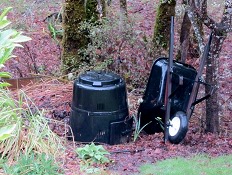|
|
|
|
Insects and
Composting
- Cold compost piles
harbor a variety of insects -
|
Summary:
A variety of insects and worms can be found
in cold-composted compost piles. These
insects aid the decomposition process and should be
left alone to do their jobs.
Jack
DeAngelis, PhD
OSU Ext.
Entomologist (ret.)
|
|
Composting
Composting is a great way to
get rid of yard and vegetable waste in an
environmentally sound manner. Not only do you keep
the waste out of the landfill but in the end you
gain a valuable product to add back to garden soil.
Composting can be as simple or as involved as you
want to make it. The simplest compost piles contain
only yard waste which slowly breaks down without any
additional inputs. It may take a year or longer to
complete the decomposition process.
|
 |
|
compost
bin
|
|
|
Hot composting
You can speed up decomposition by first
chopping or shedding the yard waste
which exposes more of the material's surface to the
decomposition process. Decomposition is even faster if
the chopped yard waste is layered with soil, and
confined to a compost bin (see photo). The
soil adds necessary nutrients and microorganisms, and
the bin holds in the heat of decomposition.
Decomposition can be further accelerated by turning
the pile to add oxygen. Layered piles that are
occasionally aerated by turning can become quite hot
because of very rapid internal microbial decomposition
and are call hot-composted.
Piles become so hot in fact that insects and worms may
not be able to survive in them.
Cold composting
Vegetable waste from the kitchen or
garden, on the other hand, contains more water and
then yard waste. The extra moisture greatly slows
decomposition because the piles never heat up to the
same degree as dry piles. Because the piles don't heat
up internally they are called cold-composted.
|
|
|
Wet, cold composting piles
typically contain large numbers of redworms, insect
larvae, and other microarthropods that could not
survive hot composting. In fact, redworms are
sometimes added to the cold compost piles to start the
decomposition process. The rearing of redworms for
worm composting is called vermiculture.
Insects in compost bins
There are a number of insects that
normally inhabit cold-composted piles especially those
that contain large amounts of wet kitchen scraps. The
insects generally are no reason for concern, in fact
they aid overall decomposition. When vegetable-based
kitchen waste is first added you may get a "bloom" of
vinegar flies (aka fruit flies) until
the mass of vegetable matter starts to break down.
Vinegar flies lay their eggs in fruit and vegetable
skins and the maggots feed on bacteria and fungi of
the rotting plant matter.
Black soldier fly maggots (larvae)
[picture
of black soldier fly maggot] can be found in
some compost bins. These large maggots often startle
those new to composting but they cause no harm. The
maggots may indicate the presence of meat or fat in
the compost, neither of which should ever be added to
your bin.
|
|
|
A variety of small insects, and related
arthropods, like collembola (springtails) and
sowbugs will colonize cold piles much as they
colonize any organic garden soil. These organisms feed
on the bacteria and fungi which in turn are feasting
on the compost. Never attempt to control these
critters with insecticides as this will disrupt
the compost pile's ecology and greatly slow
decomposition. Also, remember, never
put meat, fat, dead animals, including slugs, or
oils into your compost bin. These will rot
causing foul odors and may attract house flies,
other manure flies, and scavenging rodents. See Related
Articles below.
What are
Fruit/Vinegar Flies?
What are
Collembola?
What are Sowbugs?
|
|
|
Don't forget to bookmark
us for next time - press ctrl-D in most browsers.
|
|
|
|
Mission: To provide accurate, up-to-date and
unbiased information for solving common insect and
mite problems around your home, business and landscape
using least-toxic methods.
Please see the Disclaimer
statements as well.
|
|
|
|
Copyright © 2004-...
LivingWithBugs, LLC. All rights reserved.
|